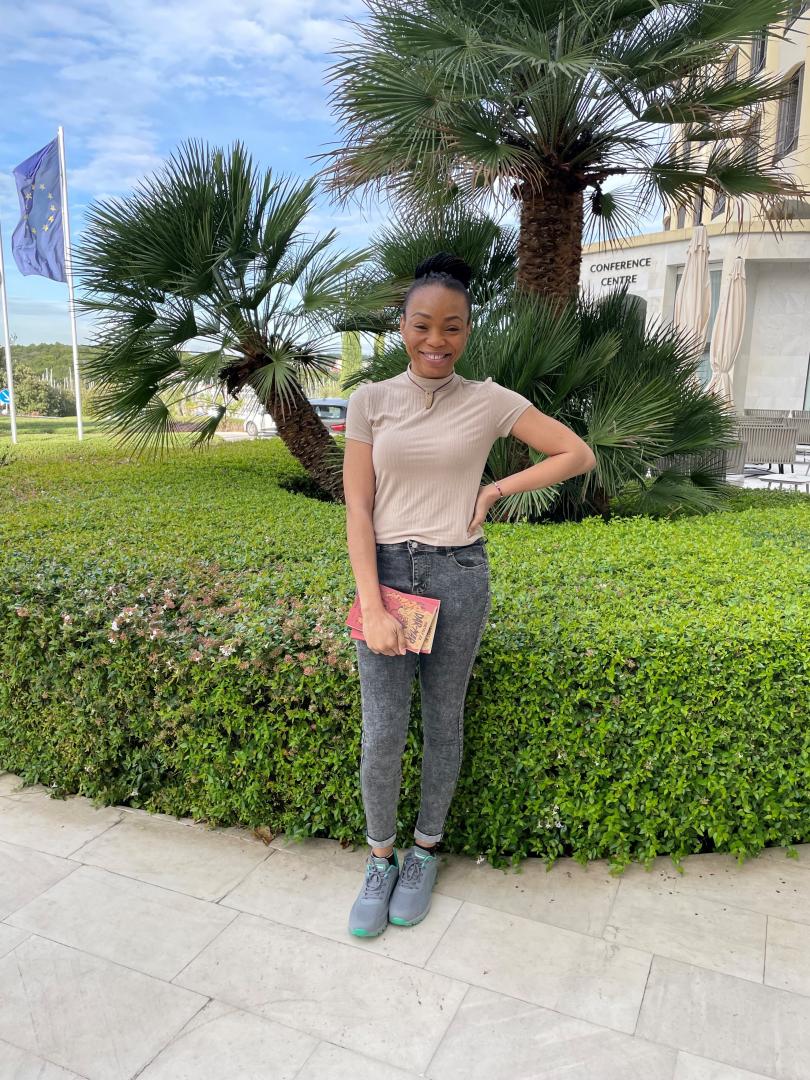By A Fish

LEXINGTON; Ky. — Writer Kasimma traveled to Croatia in 2022 to promote “Portret Za Dar-Mar,” the Croatian translation of her book, “All Shades of Iberibe.” The book is a collection of short stories mostly about Igbo people.
Every short story gives different perception into facets of life in Nigeria as well as her feelings as a devout feminist and her complex feelings towards religions.
“I wrote ‘All Shades of Iberibe’ from a place of love, deep love, for Igbo,” said Kasimma, who is from Igboland in Nigeria. “The Pula Book Fair is the biggest festival of books in Croatia. The organizers of the book fair read my book, liked it, and wanted me to come talk about the book.”
Kasimma was flattered to be invited to the Book Fair(y) in Istria, Croatia. One of the short stories in “Iberibe” is about the Nigerian–Biafran war in the late 1960s. Croatians could relate as the war over the breakup of Yugoslavian in the 1990s affected them in similar ways.
“I was excited when they sent me the invitation to Croatia because I've never been there,” she said. “It isn’t the first time I've received glamorous treatment for being a writer, but this one was different because I was a foreigner, writing about something relatable to them — the Biafran war— because of our shared experience of war. What really touched me was they were intrigued about Igbo culture. The questions they asked me were about Igbo before they talked about the war. Every event I did was packed. People gathered just to hear about Igbos! It was exciting and humbling.”
Some of the short stories in “Iberibe” are available on Kasimma’s website. One of the stories, “This Man,” is eerily like her sister's friend’s experience. The story is about ghosts trading stories of their death. Kasimma’s sister's friend's description of her own near-death experience was almost identical to the one Kasimma had written in fiction much to her surprise.
“There are so many things I wish I included in my book because of the knowledge I have now, but I don't have any regrets because at the time of writing,” she said. “I used whatever knowledge I had to its full capacity,” she said. “Because the book is about Igbo religion, culture, and people, there are many things that I thought were correct, but after researching, I found some mistakes. For example, some of the Igbo terms I used are wrong, but then they would pass as correct because any Igbo person reading the book today will still think those terms are correct.”
Many of the issues addressed in Kasimma’s writings are at their core related to feminism, spirituality and Igbo culture. When talking about feminism, she noted that misogyny hurts all parties involved. She believes we are all children of God and therefore all equal. Her keen sense of spirituality guides her writings and her belief that one should treat others as one want to be treated. She also wants to bring the Igbo people’s story to the world.
“I hope that my readers, at the very least, understand the difference: Igbo people's history is different from what they've heard, if they've even heard about Igbos before," she said. “There's been this single story of Africans as being impoverished. I decided to write about Igbo because, although I love Africa, and Igboland is in Nigeria, and Nigeria is in Africa, I am Igbo first. I do not like being lumped into Africa. It makes me invisible. Africa is an enormous continent, not country, not tribe, continent. Despite Nigeria being in Africa, I'd rather call it Nigeria instead of Africa. See us one culture at a time, understand us, and read our stories, because you cannot know somebody unless you hear from them. I hope people buy my book and read it. I want them, most notably, to understand that everybody's equal. Going back to spirituality, we are all equal children of God, and God loves Her children equally.”

